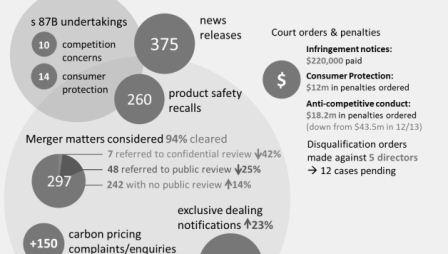Fast facts
- This is the first secondary boycott case in eight years
- The last secondary boycott case was also against the Construction Forestry Mining and Energy Union (“CFMEU”)
- The ACCC is seeking penalties from the CFMEU and union officials
- The conduct allegedly lasted for 14 months and spanned 12 construction sites
- The ACCC began investigating the conduct nearly one year before the Royal Commission into Trade Union Governance and Corruption
Paving the way: what is a secondary boycott?
Essentially, a secondary boycott involves one person (A) acting in concert with another person (B) to hinder or prevent a third party (C) from:
- supplying goods or services to a fourth party (D); or
- acquiring goods or services from a fourth party (D).

This conduct is referred to as a “secondary boycott” because it has a secondary effect on D, who is the intended target of the action.
Secondary boycotts are prohibited by sections 45D, 45DA and 45DB of the Competition and Consumer Act 2010 (Cth) (“CCA”).
Constructing the case against the CFMEU
The CFMEU is facing fines of up to $10m after the ACCC commenced proceedings in the Federal Court in November 2014. The ACCC is broadly alleging that the CFMEU engaged in secondary boycott conduct in contravention of the CCA.
Boral Resources (Vic) Pty Ltd and Alsafe Premix Concrete Pty Ltd (collectively, “Boral”) supply Grocon with concrete. For the past few years, the CFMEU has been involved in a dispute with Grocon which has resulted in work stoppages and picketing at Grocon construction sites.
The ACCC alleges that, during the dispute with Grocon, the CFMEU pressured Boral to stop supplying Grocon with concrete by banning the use of Boral concrete on Melbourne construction sites. Further, if Boral concrete was purchased, CFMEU stewards were instructed to cause significant delays through conducting safety checks on Boral concrete trucks. This conduct is said to have contravened the secondary boycott provisions of the CCA.
The ACCC also alleges that the CFMEU’s Secretary attempted to induce Boral to enter into a contract, arrangement or understanding not to supply concrete to Grocon in contravention of s 45E of the CCA and further that the CFMEU’s Assistant Secretary engaged in undue harassment or coercion of Boral in contravention of s 50 the Australian Consumer Law.
Time to rebuild
The proceedings against the CFMEU and its officers may reflect the ACCC’s intentions to crack down on secondary boycott conduct, following observations in the Harper Review Draft Report that there was a perception of insufficient public enforcement of the secondary boycott provisions (read more here). This perception was said to be particularly strong in relation to building, construction and mining industries.
Although the secondary boycott provisions have rarely been enforced, the Harper Review Draft Report did not consider that the provisions should be changed. Instead, the Draft Report recommended that the ACCC focus on enforcing the prohibitions on secondary boycotts in a timely way, to ensure that the provisions are an effective deterrent.
In addition, the Draft Report recommended implementing protocols for enforcement and investigation to be followed by specialist regulators, such as the Australian Building and Construction Commission. This recommendation is aimed at ensuring that secondary boycott conduct is promptly investigated by the appropriate agency.
Photo credit: Flickr / robert heuston







